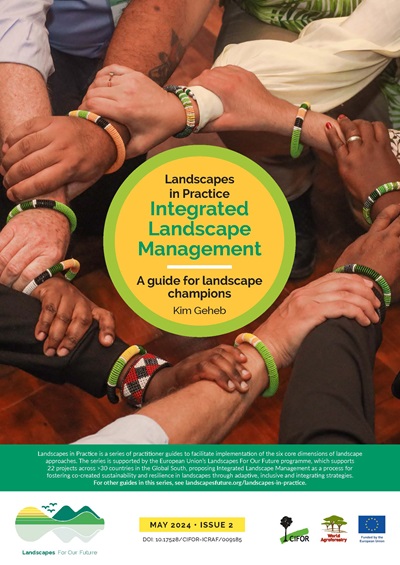We review experiences from seven landscapes located in the Congo Basin, Eastern Indonesia and Northern Australia. Landscape initiatives were applied in situations where large-scale extractive industries, local peoples’ livelihoods and global biodiversity objectives were in conflict. We found that common published principles for landscape approaches are not applied systematically in the areas studied. Practitioners draw upon landscape approach principles selectively and adapt them to deal with local conditions. We consider that landscape approaches do not provide silver bullet solutions to these situations nor do they provide an operational framework for large-scale land management. Landscape approaches do, however, provide an organising framework for disentangling the complexity of the landscape and facilitating the investigation of impacts of different courses of action. They enable alternative scenarios for what future landscapes might look like to be investigated and they create the space for multi-stakeholder negotiations. Outcomes from landscape scale approaches are determined by the power differentials amongst stakeholders and the existence, or otherwise, of functional institutions to take decisions and enforce agreements. Landscape approaches cannot overcome disparities in power or entrenched interests nor can they substitute for institutions with authority to establish and legitimise property and resource rights. They can, however, provide a mechanism around which civil society can be mobilised to achieve better land use outcomes. Landscape approaches are successful when they have strong leadership, sustained long-term and facilitated processes, good governance, adequate budgets and adequate metrics for assessing progress. Private sector engagement is necessary and all parties must have sufficient shared interest in outcomes to motivate their participation.
DOI:
https://doi.org/10.1007/s11625-014-0281-5Altmetric score:
Dimensions Citation Count:
Publication year
2015
Authors
Sayer J.A.; Margules, C.; Boedhihartono, A.K.; Dale, A.; Sunderland, T.C.H.; Supriatna, J.; Saryanthi, R.
Language
English
Keywords
landscape, mitigation, adaptation, biodiversity, conservation, food security
Geographic
Australia, Democratic Republic of the Congo, Indonesia























